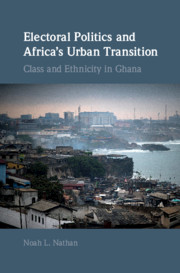Crossref Citations
This Book has been
cited by the following publications. This list is generated based on data provided by Crossref.
Nathan, Noah L.
2019.
Electoral Consequences of Colonial Invention: Brokers, Chiefs, and Distribution in Northern Ghana.
World Politics,
Vol. 71,
Issue. 3,
p.
417.
Elfversson, Emma
and
Höglund, Kristine
2019.
Violence in the city that belongs to no one: urban distinctiveness and interconnected insecurities in Nairobi (Kenya).
Conflict, Security & Development,
Vol. 19,
Issue. 4,
p.
347.
2019.
Demanding Development.
p.
305.
Baldwin, Kate
Karlan, Dean
Udry, Christopher
and
Appiah, Ernest
2020.
How Political Insiders Lose Out When International Aid Underperforms: Evidence from a Participatory Development Experiment in Ghana.
SSRN Electronic Journal,
Klaus, Kathleen
2020.
Political Violence in Kenya.
2020.
Authoritarian Police in Democracy.
p.
356.
Hassan, Mai
2020.
Regime Threats and State Solutions.
Auerbach, Adam Michael
and
Kruks-Wisner, Gabrielle
2020.
The Geography of Citizenship Practice: How the Poor Engage the State in Rural and Urban India.
Perspectives on Politics,
Vol. 18,
Issue. 4,
p.
1118.
2020.
The Political Economy of Development.
p.
110.
Deuskar, Chandan
2020.
Informal urbanisation and clientelism: Measuring the global relationship.
Urban Studies,
Vol. 57,
Issue. 12,
p.
2473.
Hicken, Allen
and
Nathan, Noah L.
2020.
Clientelism's Red Herrings: Dead Ends and New Directions in the Study of Nonprogrammatic Politics.
Annual Review of Political Science,
Vol. 23,
Issue. 1,
p.
277.
2020.
How Insurgency Begins.
p.
278.
Lewis, Janet I.
2020.
How Insurgency Begins.
2020.
Property without Rights.
p.
392.
Paller, Jeffrey W.
2021.
Everyday politics and sustainable urban development in the Global South.
Area Development and Policy,
Vol. 6,
Issue. 3,
p.
319.
Harris, J. Andrew
2021.
Election Administration, Resource Allocation, and Turnout: Evidence From Kenya.
Comparative Political Studies,
Vol. 54,
Issue. 3-4,
p.
623.
Getachew, Adom
and
Mantena, Karuna
2021.
Anticolonialism and the Decolonization of Political Theory.
Critical Times,
Vol. 4,
Issue. 3,
p.
359.
2021.
When People Want Punishment.
p.
258.
Haider, Erum A.
2021.
Democracy under duress: patronage, class and the Pakistani voter.
Commonwealth & Comparative Politics,
Vol. 59,
Issue. 2,
p.
215.
Brierley, Sarah
and
Nathan, Noah L.
2021.
The Connections of Party Brokers: Which Brokers Do Parties Select?.
The Journal of Politics,
Vol. 83,
Issue. 3,
p.
884.



